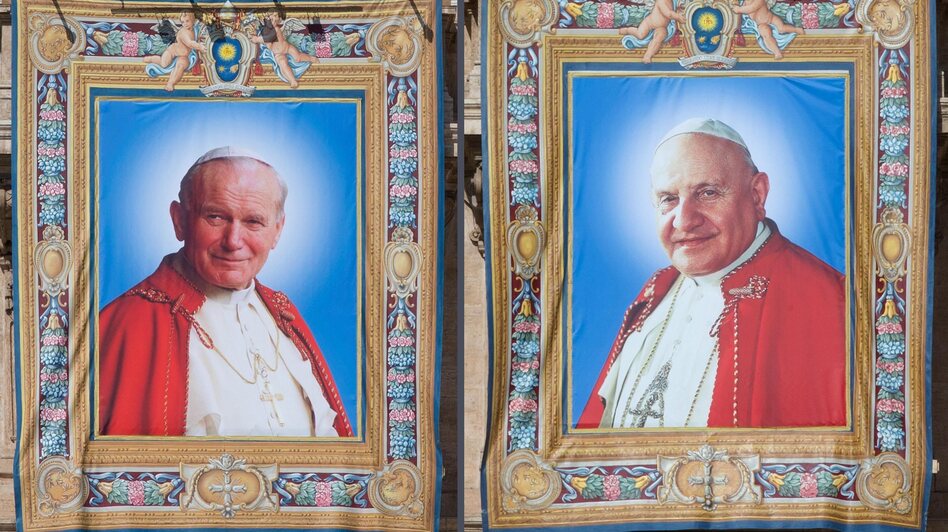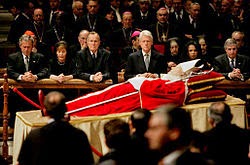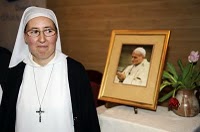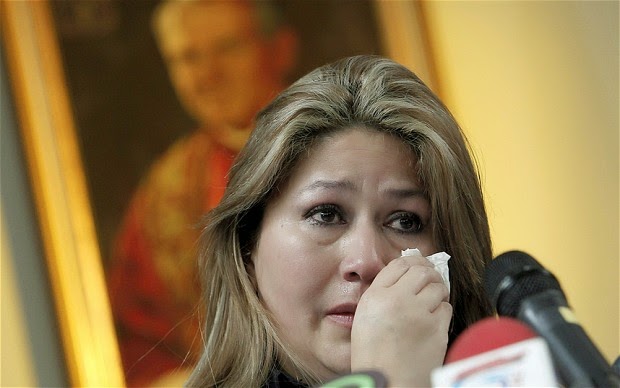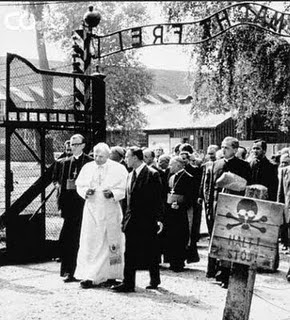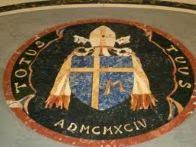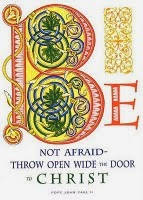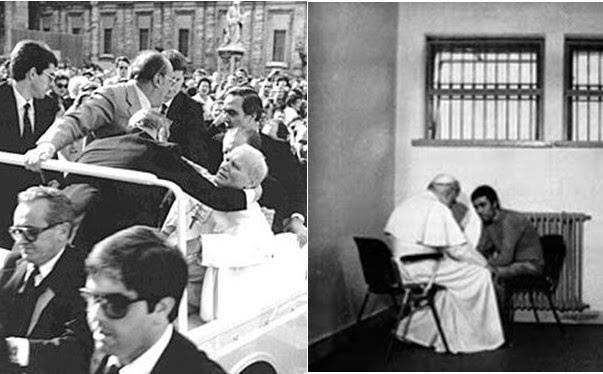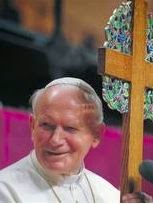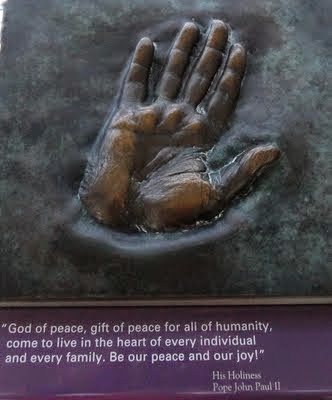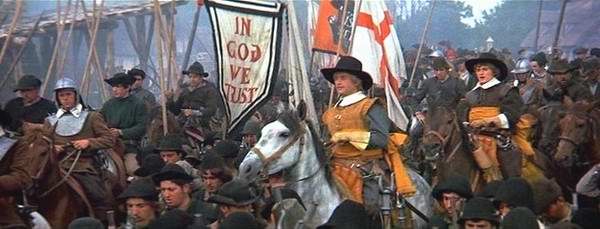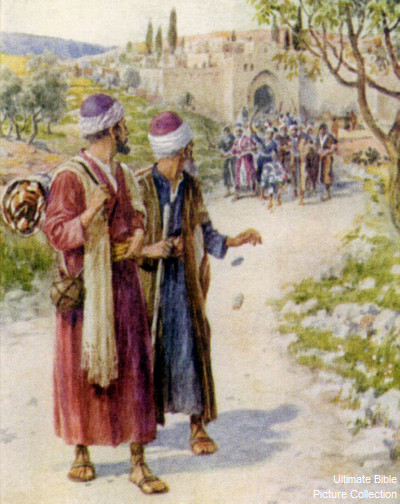Earlier this year, on this blog, I wrote two posts: one on hell, and one on purgatory.
Because we live in this "vale of tears", writing about sin and sorrow, pain and purification, seems an easier task than writing about the goal of our lives, heaven.
Indeed, heaven is the goal of all Catholics. The Baltimore Catechism question and answer on this fact remains stuck in my memory:
Question: Why did God make you?
Answer: God made me to know Him, to love Him, and to serve Him in this world, and to be happy with Him forever in the next.
If the goal is heaven, and if the focus of our actions is union with God, do we understand what heaven really is?
The popular view, repeated over and over and over in paintings and even cartoons, reveals not only a lack of imagination, but a lack of understanding as to our ultimate goal, if we merit heaven.
People gliding around in white robes on clouds seems dull to the last three generations which grew up on over-stimulated, high-tech movies and television shows. Our reaction to the seemingly dullness of heaven may be one reason why some atheists just are not interested.
But, what if we knew that heaven was a sharing in the Divine Life of God? That God in the Beatific Vision shares with us His Love, in intimacy and a completeness we cannot experience on earth, seems too vague for some to grasp the meaning of joy and peace.
We were created to know and love God. That focus remains in the cores of our beings whether we acknowledge this focus or not. Humans are enobled by love and the love of God will make us perfect.
I think of the Apollo Belvidere, one of the most beautiful statues ever created by man. One can see this in the Vatican Museum. I have seen it and it is indescribably transcendent. The Greeks knew that humans reflected a perfection not found in other natural creatures. That humans reflected the ideal of the gods and the fullness of a life of virtues was known to them through reason. But, the cracks in their philosophy had to be filled in by the Revelation to the Jews in both the Old and the New Testaments.
Within all humans resides a love of happiness and a love of order, an order which can only be brought about through the life of the virtues. All disorder is sin, and in heaven, there is no sin, only perfect order.
The deepest desires of our hearts, minds and bodies will be fulfilled in heaven, but not in the material way described by some religions.
The theologians use the term visione intuitivâ et etiam faciali. We shall see God as He is, face to face.
Pope Benedict XII in the 14th century made this a dogma of faith. We do not need to doubt that we shall see God face to face in the fullness of His Essence.
Those of us who have experienced human love understand the import of those words. When we love someone, we long to see them face to face. We long to know them and to cherish them. We long to be with them constantly.
I know a couple who have been married for 35 years and daily, this busy doctor-husband phones his wife to say hello. He works up to twelve hours a day, but always takes time to reveal his love and honor for his wife.
We crave this type of attention and recognition. We crave love and knowledge of who we are. The most terrible loneliness for some people is to never have been known, loved, and cherished by another.
God will reveal Himself to us and our intellects will be illuminated. The phrase, lumen gloriae, refers to this illumination. Some people experience this on earth, just as some experience union with God on earth, as far as possible. These people we call "saints". But, we are all called to this journey of perfection.
Our desire for heaven may be found in the Song of Songs 8:6-7.
6 Put me as a seal upon thy heart, as a seal upon thy arm, for love is strong as death, jealousy as hard as hell, the lamps thereof are fire and flames.
7 Many waters cannot quench charity, neither can the floods drown it: if a man should give all the substance of his house for love, he shall despise it as nothing.
If one can being in love for all eternity, one can imagine heaven. If one has not experienced the love of the Bridegroom-God, ask His perfect Bride, Our Lady Mary, for guidance. She, alone, of all humans, experienced heaven on earth and was raised up, body and soul into the Beatific Vision.
Dante attempts a description of this in . Cantos 30.106 to 32.138.
If we love the Mother, we shall find the Son, and thereby, the Trinity.
“Thou Virgin Mother, daughter of thy Son, Humble and high beyond all other creature, The limit fixed of the eternal counsel,
Thou art the one who such nobility To human nature gave, that its Creator Did not disdain to make himself its creature.
Within thy womb rekindled was the love, By heat of which in the eternal peace After such wise this flower has germinated.
Here unto us thou art a noonday torch Of charity, and below there among mortals Thou art the living fountain-head of hope.
Lady, thou art so great, and so prevailing, That he who wishes grace, nor runs to thee, His aspirations without wings would fly.
Not only thy benignity gives succour To him who asketh it, but oftentimes Forerunneth of its own accord the asking.
In thee compassion is, in thee is pity, In thee magnificence; in thee unites Whate’er of goodness is in any creature.
Now doth this man, who from the lowest depth Of the universe as far as here has seen One after one the spiritual lives,
Supplicate thee through grace for so much power That with his eyes he may uplift himself Higher towards the uttermost salvation.
And I, who never burned for my own seeing More than I do for his, all of my prayers Proffer to thee, and pray they come not short,
That thou wouldst scatter from him every cloud Of his mortality so with thy prayers, That the Chief Pleasure be to him displayed.
See the Catholic Encyclopedia online for more info.
More here....http://supertradmum-etheldredasplace.blogspot.com/2012_08_19_archive.html


